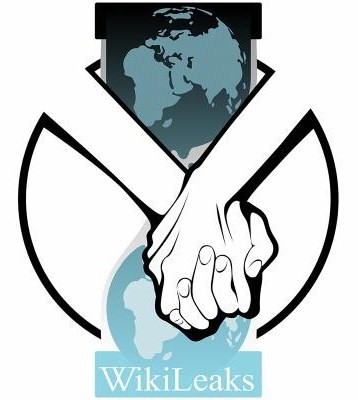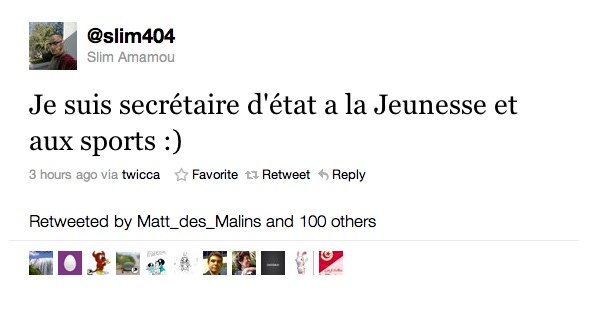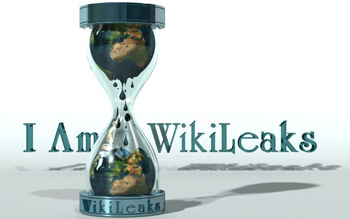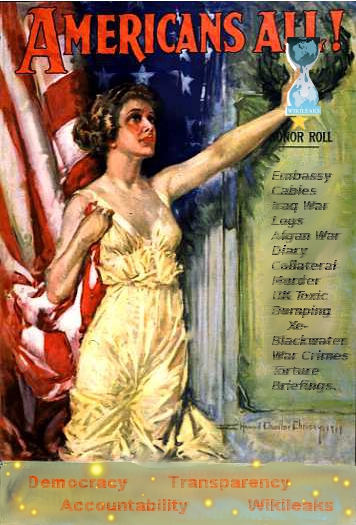 Julian Assange spoke today to a gathering in Melbourne organized by the WikiLeaks Defence Committee and the Australian Media, Entertainment and Arts Alliance, who presented Assange (via his lawyer) with his membership card in the union as a journalist.
Julian Assange spoke today to a gathering in Melbourne organized by the WikiLeaks Defence Committee and the Australian Media, Entertainment and Arts Alliance, who presented Assange (via his lawyer) with his membership card in the union as a journalist.
His filmed address, played to a free-speech forum at Federation Square in Melbourne, touched on a number of WikiLeaks' guiding principles as well as on immediate political pressures on the organization and on Assange himself. Repeatedly, he united those two concerns, principled and practical:
We at WikiLeaks recognize the difference between secrecy and privacy. ... We believe in transparent power, not in transparent people.
Via @Asher_Wolf and @joycelowenstein on Twitter, and Greg Mitchell at The Nation
Snorre Valen, a member of the Norwegian parliament, has nominated WikiLeaks for this year's Nobel Peace Prize.
In motivating his nomination, Mr Valen writes:
... many seek to redraw the map of information freedom with the emergence of institutions like Wikileaks. Political powers and institutions that ordinarily protect freedom of speech suddenly warn against the danger, the threat to security, yes even the “terrorism” that Wikileaks represent. In doing so, they fail in upholding democratic values and human rights. In fact, they contribute to the opposite. It is not, and should never be, the privilege of politicians to regulate which crimes the public should never be told about, and through which media those crimes become known.
Liu Xiabao was awarded the Nobel Peace Prize last year for his struggle for human rights, democracy and freedom of speech in China. Likewise: Wikileaks have contributed to the struggle for those very values globally, by exposing (among many other things) corruption, war crimes and torture – some times even conducted by allies of Norway. And most recently: By disclosing the economic arrangements by the presidential family in Tunisia, Wikileaks have made a small contribution to bringing down a 24-year-lasting dictatorship.
Today, the Financial Times reported that the Hungarian government was willing to accommodate the legal issues raised last week by the EU commission. Mr Martonyi, Hungary's foreign minister said:
This issue of the Hungarian media law has become the subject of a pan-European political fight. Some political families felt that this is perhaps the topic they can use for their own political purposes. Brussels’ legal findings against the government’s media law could easily be overcome.
While accepting an award for distinction in international law and affairs from the NY Bar Association, Geoffrey Robertson, who will defend Wikileaks founder Julian Assange at his extradition hearings in London in February, warned that the United States "risked irrevocable damage to its reputation if it pursued Assange" by "aiming the blunderbuss of its 1917 Espionage Act, death penalty and all, at a publisher who is a citizen of a friendly nation," according to the The Age: US told to drop Assange pursuit.
The Sydney Morning Herald writes:
Al Jazeera launches Transparency Unit:
Launched in January 2011, the Al Jazeera Transparency Unit (AJTU) aims to mobilize its audience - both in the Arab world and further afield - to submit all forms of content (documents, photos, audio & video clips, as well as “story tips”) for editorial review and, if merited, online broadcast and transmission on our English and Arabic-language broadcasts. ...
From human rights to poverty to official corruption, AJTU will fairly evaluate and pursue all leads and content submitted, without geographical, political, cultural, or religious bias.
Reuters reported today on possible EU legal action against Hungary for its new media law passed in 2010 (reported here by WL Central). Hungary has two weeks to show that the new law complies with EU rules regarding free speech and media freedom, and with EU regulations on broadcasting. The report goes on to state:
The commission, which serves as the EU executive body, is concerned whether the new rules limit freedom of expression in Hungary by requiring all broadcasters to provide balanced coverage of news and to register with a state authority.
The full article can be read here.
Today, The German news outlet Frankfurter Rundschau reported on some comments made by Jebali Hamadi. Hamadi was the leader of the Islamic party Al-Nahdha just prior to the fall of the Ben Ali government of Tunisia. In the brief interview, Jebali Hamadi is reported to have said:
Aber eine Beteiligung an dieser Regierung lehnen wir ab. Wir wollen eine Regierung, an der sich alle beteiligen, ohne Ausnahme.
(Participation in this government, we reject. We want to be involved in a government in which all political parties are equally represented, without exception.)
Jebali Hamadi continued in the interview to state:
Wir sind gegen Einschränkungen. Aber schauen Sie auf die Straße! Das Volk hat sich gegen die Politik der RCD ausgesprochen. Wer in die Repression verwickelt ist, kann nicht an der Regierung beteiligt werden
Folks:
I call this blog 'Tools of the Trade'. What I'll attempt to do here is to focus on the technologies behind the Wikileaks story. This could be hardware, software and even just concepts which, when wedded with technology, produce results the makers never conceived of. Let's look at secure networks, encryption, national and corporate censorship... as well as how folks circumvent it, smart phones, thumb drives and other ways of staying connected.
In a report on Wikileaks, Bloomberg disclosed on January 20 that U.S. authorities may now be using contractors to spy on Swedish servers looking for creative ways to prosecute Wikileaks and Julian Assange.
Bloomberg reports that Robert Boback, Chief Executive Officer of Tiversa, Inc., a spying and surveillance firm that contracts with the FBI, declined to say who his company's client was when his firm surveilled four unidentified Swedish servers.
According to Boback, during a 60 minute period on February 7, 2009:
"Tiversa’s monitors detected four Swedish computers engaged in searching and downloading information on peer-to-peer networks. The four computers issued 413 searches, crafted to find Microsoft Excel spreadsheets and other information-rich documents among some of the 18 million users the company estimates are on such file-sharing networks at any given moment."
Tiversa also claims that:

Slim Amamou, the blogger and net-neutrality activist jailed by Ben Ali's outgoing government during Tunisia's Sidibouzid revolution, has been named the new secretary of state for Youth and Sports, reports Anne Brigaudeau.
"Thursday he announced on Twitter, 'I am free.' And Monday: 'I am secretary of state for Youth and Sports. :)'"
Amamou's first tweet as secretary was "My boss is Mohamed Aloulou. Who is he?"

Global: Media Blitz to support Wikileaks
Date and time: Tuesday, January 11 · 10:30h - 13:30h
Details: http://www.facebook.com/event.php?eid=120437981357342
Global: Wikileaks Flash Mob Event
Date and time: Wednesday, January 12 · 15:30h - 17:00h
Details: http://www.facebook.com/event.php?eid=112718522134191
Global: Global Protest
Date and time: Saturday 15 January 2011, 18:00h
Details: http://freewikileaks.eu/en/protests/
Global: Anonymous in defense of WikiLeaks and freedom of expression
Date and time: Saturday 15 January 2011
Details: http://www.whyweprotest.net/en/
Event Information: http://forums.whyweprotest.net/forums/planning.283/
Global: Global WikiLeaks Support Rally
Date and time: Saturday 5 February 2011, 15:00h local time
Details: http://www.facebook.com/pages/WikiLeaks-Supporters-United-global-Support...
Global: Freedom of Information Rally
Date and time: Third Saturdays Every Month
Location: Earth, Everywhere
Details: http://www.whyweprotest.net/en/
Event Information: http://forums.whyweprotest.net/forums/planning.283/


The nature of the Internet makes detailed, concise, well thought out arguments almost impossible. The fluidity, the ebb and flow of information all conspire against the well thought out essay. In the past weeks, months even, there has been numerous attempts by myself and others to boil down the main arguments, the main points to be made, to try and shine some light into the encroaching darkness. While some have made a good go of it, placing cap-stones on some of the more pressing issues; others have failed miserably. I am forced to concede, alas, I am in the "fail" category.
I can hardly count the numerous "beginnings" of essays; which, in my heart of hearts I felt, were Surly to illuminate and keep the darkness at bay. However, it seems, new information, new spins on old information come flooding; torrents of rumors, facts and fallacies kaleidoscope round; peculate and illustrate most macabre.
This will not happen now.
Further to my open letter on those inciting murder upon Julian Assange, this op ed style post again responds to those who say that Julian Assange should be kidnapped, executed, murdered or otherwise be "whacked", to use a favourite Hollywood gangster expression. It is a much expanded variant of the open letter to the inciters at Wikileaks Central.
The CIA and/or US military forces have been invoked by some, as the agents who would carry out such extra curial "services" of which it must be said, such actions both incitement and carrying the incitement out, are undoubtedly unlawful. Doubtless the early December Assange-illegal-posturing Prime Minister of Australia would not officially, take kindly to the latter course of action.
The web roll of inciters or borderline inciters is growing.
OpEdNews has an interviewwith Shanna Devine, the Legislative Campaign Coordinator at GAP [the Government Accountability Project]. The US Whistleblower Protection Enhancement Act (S. 372) was just defeated in the House. Ironically, the protection to expose secrets was blocked by something called a "secret hold", one anonymous person.
S. 372 would have increased opportunities for whistleblowers to expose wrongdoing within a system instead of relying on external organizations for exposure. It would have eliminated current loopholes such as:
Currently, you are not eligible for federal whistleblower protection if : you are not the first person who discloses given misconduct; you make a disclosure to your co-worker; you make a disclosure to your supervisor; you disclose the consequences of a policy decision; and the kicker: if you blow the whistle while carrying out your job duties.
As reported by Amnesty International and Der Speigel Hungary is introducing a new law coming into force on January 1, 2011 (the same time Hungary will be taking over the EU presidency) which will impose unprecedented restrictions on the freedom of the press in the European Union.
Amnesty:"A newly created National Media and Communications Authority (NMHH) will have the power to impose heavy fines, ranging from up to 35,000 Euros for periodicals to up to 730,000 Euros for broadcast media, for content it considers to run counter to the “public interest”, “common morality” and “national order”. Fines can also be imposed for “unbalanced” news reporting.
None of these terms are clearly defined in the law and their interpretation is left to the NMHH. The NMHH also has the power to shut down news outlets.
There are also concerns about the political independence of the National Media and Communications Authority, whose five board members were appointed by the ruling Fidesz party without broader consultation or any parliamentary scrutiny."
The Executive Director for the Rosenberg Children's Fund and long time activist, Robert Meeropol, made a statement last week urging support and defense of Julian Assange in anticipation of the use of the US Espionage Act against him. Meeropol's own experiences with the Espionage Act have led him to extend particular criticisms of its use in a constitutional context. It is with this in mind that he voices support for Julian Assange.
I view the Espionage Act of 1917 as a lifelong nemesis. My parents were charged, tried and ultimately executed after being indicted for Conspiracy to Commit Espionage under that act.
The 1917 Act has a notorious history. It originally served to squelch opposition to World War I. It criminalized criticism of the war effort, and sent hundreds of dissenters to jail just for voicing their opinions. It transformed dissent into treason.
Many who attacked the law noted that the framers of the Constitution had specifically limited what constituted treason by writing it into the Constituton: “Treason against the United States shall consist only in levying war against them, or in adhering to their enemies, giving them aid and comfort” (Article III, section 3). The framers felt this narrow definition was necessary to prevent treason from becoming what some called “the weapon of a political faction.” Furthermore, in their discussions at the Constitutional Convention they agreed that spoken opposition was protected by the First Amendment and could never be considered treason.
AolNews reports that US government agencies have requested a firewall to block Wikileaks' data from entering their systems regardless of its origin.
Fidelis Security, a Boston-based network security company that works with the military and other government agencies, says it's being asked to set up a firewall against WikiLeaks document traffic, regardless of whether it flows from a website, e-mail or other source. ...
The Air Force, for example, has started blocking news media sites such as The New York Times that have re-posted some of the documents.
But Bertone said that the Air Force approach wouldn't prevent someone from being e-mailed a leaked document, or accessing a website that hasn't been specifically blocked by the Air Force.
As Joe Biden condemns Julian Assange as a "high-tech terrorist" and affirms that officials in the US Justice Department were actively exploring ways to prosecute Assange, some of the country's media organizations have been issuing statements in wary opposition.
The US media reaction is well outlined by Glenn Greenwald's December 14th article, 'Attempts to prosecute WikiLeaks endanger press freedoms' and was followed up today by a deferential and roundabout article in the NYTimes which eventually concludes:
It is not necessary for America to erect a Chinese-style “Great Firewall” to filter out government criticism; if Mr. Assange were prosecuted, would-be whistleblowers and news tipsters would have to think twice before taking action.
That would be bad news for American journalism ...
In the WikiLeaks saga, other commentators have elevated the stakes further, describing the cable dump, the bellicose official response and the juvenile efforts by hackers sympathetic to WikiLeaks as the opening salvoes of a long-awaited cyberwar.
Does it really make sense for Washington to escalate? This is one war in which most of the collateral damage would be American.
Internationally, the verdict is much more clear. EFF's article on December 16th reiterated their own opposition to censorship and their online campaign as well as summarized statements from the following organizations:
Yesterday, the US House Judiciary Committee hosted a panel of Constitutional Law and national security scholars to look at the question of whether Wikileaks or Julian Assange could or should be prosecuted for publishing leaked data from the US. The three and a quarter hour hearing is available here, and an article has been posted about it today by Matt Schafer on Lippmann Would Roll.
LWR's overall verdict was as follows:
When all was said and done, the witnesses seemed to agree, in part, that the government is overclassifying information, the Espionage Act of 1917 is likely unconstitutional, the SHIELD Act, proposed recently by Sen. Joe Lieberman [I-CT], rests on a shaky constitutional footing also, and it is important that the legislature not overreact to the WikiLeaks cables. ...
Almost all witness cited flaws within the Espionage Act, while the consensus on whether WikiLeaks is protected by the First Amendment did not enjoy a similar consensus. With all witnesses having testified, four argued that Wikileaks is protected by the Constitution, two argued that it should be prosecuted, and witness Stephen Vladeck abstained from making a determination on WikiLeaks.
Theme by Danetsoft and Danang Probo Sayekti inspired by Maksimer